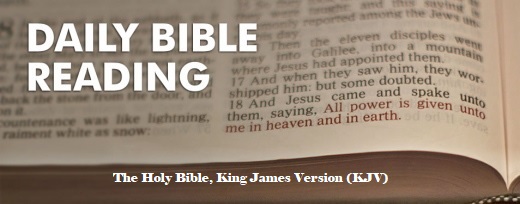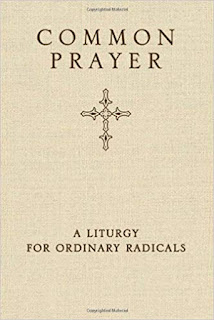The Daily Readings
THURSDAY, September 3, 2020
Psalm 149; Exodus 9:1-7; 2 Corinthians 12:11-21
The Holy Bible, King James Version (KJV)
Today's Verse-of-the-Day: Isaiah 48:17
Thus saith the Lord, thy Redeemer, the Holy One of Israel; I am the Lord thy God which teacheth thee to profit, which leadeth thee by the way that thou shouldest go.
Today's Readings:
Sing praise in the congregation
1 Praise ye the Lord. Sing unto the Lord a new song, and his praise in the congregation of saints.
2 Let Israel rejoice in him that made him: let the children of Zion be joyful in their King.
3 Let them praise his name in the dance: let them sing praises unto him with the timbrel and harp.
4 For the Lord taketh pleasure in his people: he will beautify the meek with salvation.
5 Let the saints be joyful in glory: let them sing aloud upon their beds.
6 Let the high praises of God be in their mouth, and a two-edged sword in their hand;
7 To execute vengeance upon the heathen, and punishments upon the people;
8 To bind their kings with chains, and their nobles with fetters of iron;
9 To execute upon them the judgment written: this honour have all his saints. Praise ye the Lord.
Another plague: Egypt’s animals die
9:1 Then the Lord said unto Moses, Go in unto Pharaoh, and tell him, Thus saith the Lord God of the Hebrews, Let my people go, that they may serve me.
2 For if thou refuse to let them go, and wilt hold them still,
3 Behold, the hand of the Lord is upon thy cattle which is in the field, upon the horses, upon the asses, upon the camels, upon the oxen, and upon the sheep: there shall be a very grievous murrain.
4 And the Lord shall sever between the cattle of Israel and the cattle of Egypt: and there shall nothing die of all that is the children's of Israel.
5 And the Lord appointed a set time, saying, To morrow the Lord shall do this thing in the land.
6 And the Lord did that thing on the morrow, and all the cattle of Egypt died: but of the cattle of the children of Israel died not one.
7 And Pharaoh sent, and, behold, there was not one of the cattle of the Israelites dead. And the heart of Pharaoh was hardened, and he did not let the people go.
Sinners warned but unrepentant
12:11 I am become a fool in glorying; ye have compelled me: for I ought to have been commended of you: for in nothing am I behind the very chiefest apostles, though I be nothing.
12 Truly the signs of an apostle were wrought among you in all patience, in signs, and wonders, and mighty deeds.
13 For what is it wherein ye were inferior to other churches, except it be that I myself was not burdensome to you? forgive me this wrong.
14 Behold, the third time I am ready to come to you; and I will not be burdensome to you: for I seek not yours but you: for the children ought not to lay up for the parents, but the parents for the children.
15 And I will very gladly spend and be spent for you; though the more abundantly I love you, the less I be loved.
16 But be it so, I did not burden you: nevertheless, being crafty, I caught you with guile.
17 Did I make a gain of you by any of them whom I sent unto you?
18 I desired Titus, and with him I sent a brother. Did Titus make a gain of you? walked we not in the same spirit? walked we not in the same steps?
19 Again, think ye that we excuse ourselves unto you? we speak before God in Christ: but we do all things, dearly beloved, for your edifying.
20 For I fear, lest, when I come, I shall not find you such as I would, and that I shall be found unto you such as ye would not: lest there be debates, envyings, wraths, strifes, backbitings, whisperings, swellings, tumults:
21 And lest, when I come again, my God will humble me among you, and that I shall bewail many which have sinned already, and have not repented of the uncleanness and fornication and lasciviousness which they have committed.
Optional parts of the readings are set off in [square brackets.]
The Bible texts of the Old Testament, Epistle, and Gospel lessons are from The Holy Bible, King James Version (KJV).
The Daily Bible Readings are selected from the Revised Common Lectionary Daily Readings, a three-year cyclical lectionary. We are currently in Year A. Beginning with the first Sunday of Advent in 2020, we will be in Year B. The year which ended at Advent 2019 was Year C. These readings complement the Sunday and festival readings: Thursday through Saturday readings help prepare the reader for the Sunday ahead; Monday through Wednesday readings help the reader reflect and digest what they heard in worship. Revised Common Lectionary Daily Readings, copyright © 2005 Consultation on Common Texts. www.commontexts.org
The Daily Readings for THURSDAY, September 3, 2020
Psalm 149; Exodus 9:1-7; 2 Corinthians 12:11-21 (KJV)










